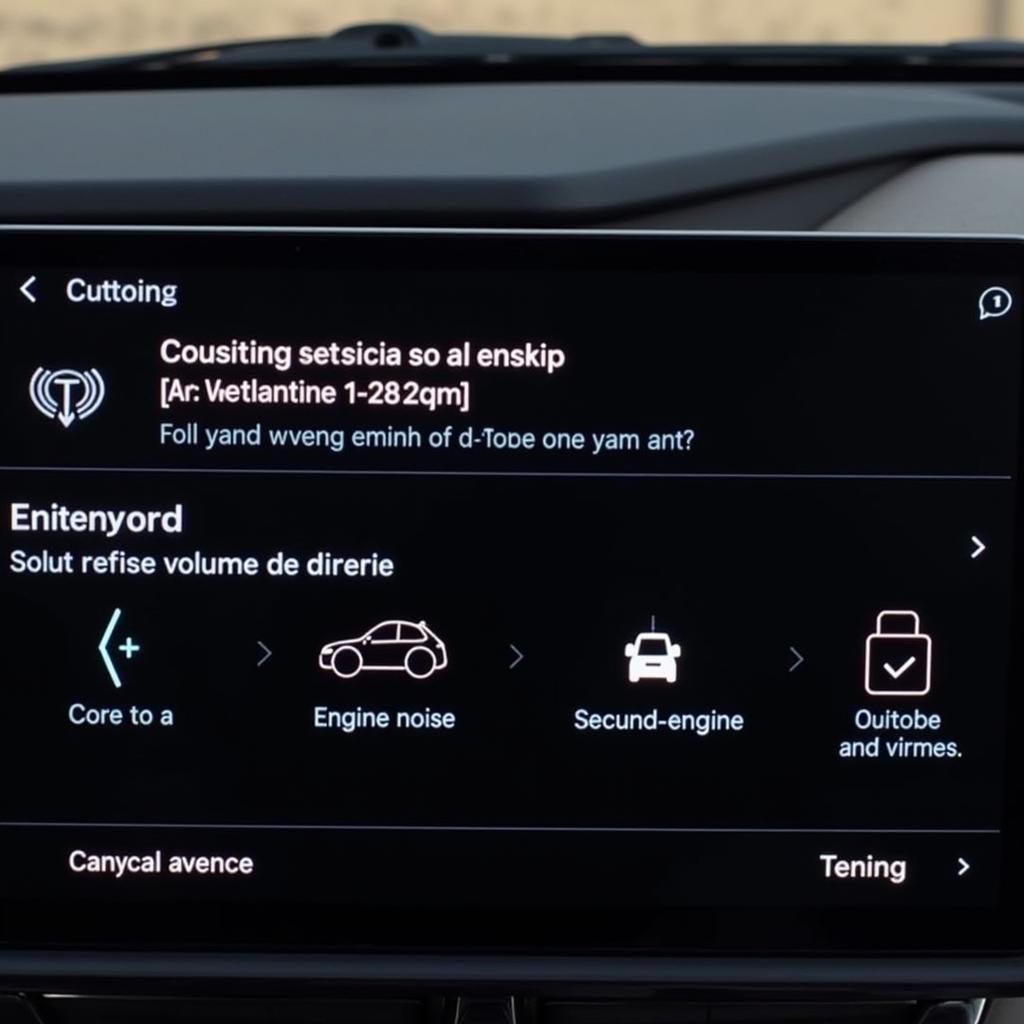The 2009 BMW M3’s exhaust sound is legendary among car enthusiasts. It’s a symphony of high-revving power, a sound that signifies performance and precision German engineering. But what makes it so special? This article will explore everything you need to know about the 2009 BMW M3 exhaust sound, from its unique characteristics to common problems and modifications.
Understanding the 2009 BMW M3’s Exhaust Note
The 2009 BMW M3 boasts a naturally aspirated 4.0-liter V8 engine, a departure from the inline-6 engines of previous generations. This S65 engine is a masterpiece, producing a distinctive high-pitched wail that is instantly recognizable. Unlike the turbocharged engines found in later M3 models, the S65’s naturally aspirated design contributes significantly to its unique sonic signature. The exhaust system itself is designed to enhance this natural sound, creating a thrilling experience for both the driver and anyone within earshot.
Why is the 2009 BMW M3 Exhaust Sound So Popular?
The 2009 BMW M3 exhaust sound is popular due to its unique combination of high-pitched wail and aggressive growl. The naturally aspirated V8 engine allows for a linear power delivery and a thrilling soundtrack as the revs climb towards the 8,400 RPM redline. This distinct sound separates it from the more muted or synthesized sounds of turbocharged vehicles.
How Does the Exhaust System Work?
The exhaust system carries exhaust gases away from the engine, reducing noise and emissions. In the 2009 BMW M3, this process is carefully tuned to create the signature exhaust note. The exhaust manifolds collect the gases from the engine cylinders, which then pass through catalytic converters to reduce harmful pollutants. Finally, the gases flow through the muffler, which shapes the sound before exiting through the exhaust tips.
Common Exhaust Problems in the 2009 BMW M3
While the 2009 BMW M3’s exhaust system is generally reliable, some issues can arise. These can include leaks, rattles, and a decrease in sound quality.
What Causes Exhaust Leaks?
Exhaust leaks are often caused by corrosion, damaged gaskets, or cracks in the exhaust system components. These leaks can not only affect the sound but also lead to decreased performance and increased emissions.
How to Diagnose Exhaust Problems?
Diagnosing exhaust problems requires careful inspection and listening. Look for signs of rust, damage, or soot buildup. Listen for unusual hissing or rattling sounds. A professional inspection can identify the specific issue.
“Regular inspection of your M3’s exhaust system is crucial for maintaining its optimal performance and that iconic sound,” advises Michael Schmidt, a veteran BMW technician with over 20 years of experience. “Addressing issues early can prevent more costly repairs down the road.”
Modifying the 2009 BMW M3 Exhaust
Many owners choose to modify their 2009 BMW M3’s exhaust to further enhance the sound or improve performance. Aftermarket exhaust systems, mufflers, and exhaust tips can alter the tone and volume of the exhaust note.
What are the Benefits of an Aftermarket Exhaust?
Aftermarket exhaust systems can offer increased horsepower, a more aggressive sound, and weight reduction. However, it’s important to choose a quality system that is compatible with the 2009 BMW M3.
“Choosing the right aftermarket exhaust system is essential,” says Schmidt. “A poorly designed system can negatively impact performance and create unwanted drone.” He further emphasizes the importance of professional installation for optimal results.
Conclusion
The 2009 BMW M3 exhaust sound is a hallmark of its performance and character. Understanding its components, common problems, and modification options allows owners to appreciate and maintain this iconic sound. Regular maintenance and addressing any issues promptly will ensure that the 2009 BMW M3 continues to deliver its thrilling driving experience.
FAQ
- What makes the 2009 BMW M3 exhaust sound unique? The naturally aspirated V8 engine and specifically designed exhaust system create a distinct high-pitched wail.
- What are common exhaust problems in a 2009 BMW M3? Leaks, rattles, and decreased sound quality are some common issues.
- How can I modify the exhaust sound? Aftermarket exhaust systems, mufflers, and exhaust tips can alter the sound.
- Why is it important to address exhaust problems promptly? Ignoring issues can lead to decreased performance, increased emissions, and more costly repairs.
- What should I look for when choosing an aftermarket exhaust? Choose a quality system compatible with the 2009 BMW M3 and consider professional installation.
- How often should I inspect my exhaust system? Regular inspections, especially if you notice any changes in sound or performance, are recommended.
- Can exhaust leaks affect engine performance? Yes, exhaust leaks can negatively impact engine performance and fuel efficiency.
If you’re experiencing a bmw ticking sound, it could be related to a different system entirely.
Need help with your 2009 BMW M3? Contact us via Whatsapp: +1 (641) 206-8880, Email: CARDIAGTECH[email protected] or visit us at 276 Reock St, City of Orange, NJ 07050, United States. Our team is available 24/7 to assist you.

